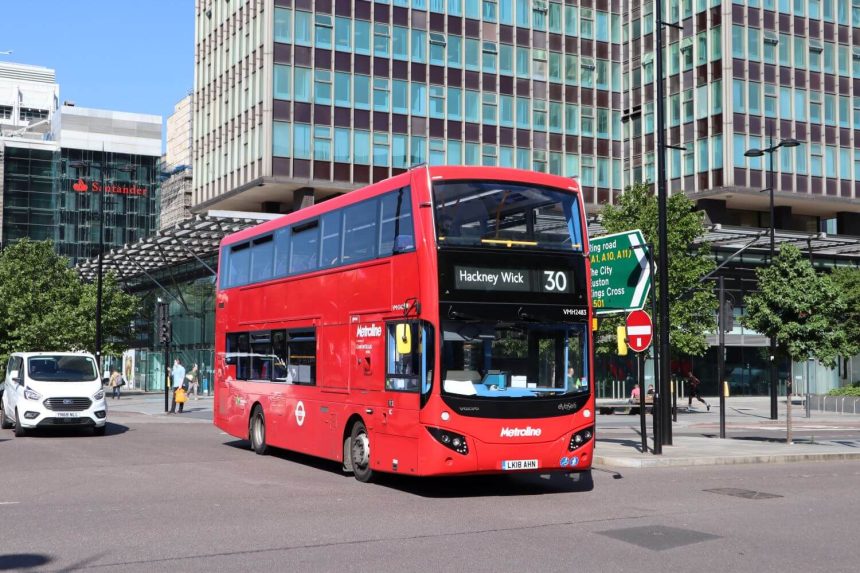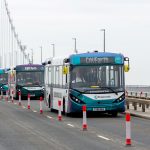Metroline CEO Sean O’Shea reflects on the past, present and future as the operator marks a key milestone under ComfortDelGro ownership
The heralding in of a new millennium coincided with a dawn of a new era for Metroline as it was sold to the Singapore-based DelGro Corporation (now ComfortDelGro) 25 years ago. A quarter of a century on, the operator is at what could be another pivotal juncture.
Having begun this year to operate Bee Network services in Greater Manchester, the business which had previously focused almost exclusively on franchised routes in London looks set to bid for more contracts in the emerging reregulated areas.
Sean O’Shea, Metroline Chief Executive Officer, has been there from the start. Having begun his career there in 1990 with what was then London Buses before it was split into 11 companies, one of which was Metroline, he was Chief Operating Officer from 2005 onwards before becoming CEO in 2018.
Although much has changed on the London bus scene over those 25 years, Sean sounds a familiar note when asked what the main challenges were for operators in the capital back then.
“Twenty-five years ago, staffing was one of our biggest challenges broadly,” he says. “Road congestion affecting our ability to offer reliable services was also a major issue with the start of the congestion charge still three years away.”

While some issues remain, he adds: “There was a lot of competition. The larger groups hadn’t consolidated as much as now, so there were quite a few small companies nipping at our heels and taking our drivers away from us. They didn’t have training schools, so they didn’t have as large overheads as we had.”
Metroline has itself taken part in the consolidation process, with Irish Citylink, Armchair Passenger Transport and Adventure Travel among the brands it has acquired over the last 25 years.
In the late-1990s, Metroline was already one of the top five London bus operators, but it had ambitions to grow, and it was ComfortDelGro’s backing which allowed this to happen.
With ComfortDelGro having since invested £673 million in the UK, including £336 million in public transport, Metroline operates approximately 16% of London’s scheduled bus mileage.
Its 1,400 buses in London transport around a million passengers per day, while its fleet of 400 in Greater Manchester caters for about a million per week – a service provided by 6,200 staff nationally.
More franchise bids expected from Metroline?
At a time when several mayoral combined authorities are heading towards bus franchising and the government is promoting the model to local authorities under new powers being granted to them, it seems likely that will give rise to further growth for Metroline.
The vast majority of the operator’s bus business is based on franchising. The parent company is a majority owner of SBS Transit, the largest bus operator in Singapore, where a similar model is in place.
Metroline’s move into Manchester to cover 232 services led to its employing 1,400 new staff and increasing its overall portfolio by 30%. It has already confirmed it will bid for tenders in Liverpool City Region and West Yorkshire as those areas move to franchising.
Everywhere can make franchising work – Sean O’Shea
“As to future franchises, it depends on how they’re structured, whether it suits our business to operate them and whether they come in a way that means we can bid for them,” says Sean.
The relatively rapid move to regulated services could create problems for operators, he highlights. West Midlands, Cambridgeshire and Peterborough, South Yorkshire, the Welsh Government and Strathclyde Partnership for Transport have already committed to taking that route. Franchising pilots for other authorities are on the way.
“There are so many authorities now looking to franchise bus services that it is almost inevitable that there will be a capacity issue for operators like Metroline if they all come along at once. If authorities talk to each other about their franchise timetables I think they will get better outcomes,” he says.
As to how these contracts will be set up, Metroline is prepared to be flexible, he says, pointing out that a route-by-route approach “broadly works” in London. He expects future contracts to be awarded on an area-by-area basis, as in Greater Manchester.

However, he adds: “We as a group are quite adept at working with the authority to meet its requirements. So, there might be the odd occasion where we’d say, ‘if you do it this way it would be better’.
“But authorities don’t necessarily want to hear what has been done in another authority because they are individual and have its own requirements, so we’ll work with that. I think that’s a key skill that we bring.”
Sean adds: “Everywhere can make franchising work and [authorities] can work with partners like ComfortDelGro, which is bidding for those contracts to provide high-quality services; there is absolutely no question about that.”
Battling congestion
Congestion and slow bus speeds are arguably bigger issues in London than elsewhere in the UK.
If the London congestion charge at the start of the Metroline journey with ComfortDelGro eased matters, it appears to be less effective now. The average bus speed across London is less than 10mph and in parts of the city is said to be less than 7mph.
Speaking at Metroline’s 25th anniversary event in June at Cricklewood garage, where roadworks saw buses crawling along the main road outside, Sean says: “Roadworks are a real issue. At times it feels like the wild west because there is no simple answer.
The authorities need to be more quizzical about the reasons for digging up the road and, when you’re doing it, be efficient about it – Sean O’Shea
“There are a lot of people that can allow work to happen in an area without necessarily coordinating it. The authorities need to be more quizzical about the reasons for digging up the road and, when you’re doing it, be efficient about it.
“The roadworks often give way to temporary traffic lights which are often really ineffective because they’re not designed to work with traffic in a way that the permanent traffic light system does.”
Metroline and use of AI
Partly as a means of addressing the slow bus speeds, Metroline this year became the first London operator to implement FlowOS Live, an AI-assisted system for the control room designed to improve service efficiency.
“It’s a tool for our controllers – not a replacement for them,” says Sean.

“It’s using the processing power of the computer to take more information and give what might then be a better answer. Part of our trial was to do that check of whether a controller can make a better decision using that tool, and the answer was yes.
“We’re now enabling that across the fleet so that our controllers can see the options that they might be able to deploy to give a better service.”
Metroline at the forefront in decarbonisation
It is another form of technology which Sean brings up when asked about the biggest surprises in how the industry has changed over the last 25 years. He was taken aback by how quickly proliferation of zero-emission vehicles occurred.
“We run one of the biggest hybrid fleets in the country. We went to hybrid as a gap between diesel and electric and, in reality, it probably would have been better just to wait for the electric vehicles to come because they came really quickly,” he says.
Metroline has been among the pioneers of decarbonisation technology. In addition to those 700 hybrid buses, in 2019, Metroline launched London’s first fully electric double-deck bus routes.
In 2021, it added the first hydrogen fleet of double-decker buses in England. By the end of this year, it expects to have more than 500 zero-emission buses in London – nearly half the fleet – plus 150 in Manchester.
TfL’s Bus Safety Standard
Safety is another hot topic in London, given Transport for London’s (TfL) ambitious target that no one should be killed in or by a London bus by 2030. Despite TfL’s comprehensive Bus Safety Standard, tragic incidents have occurred, as elsewhere.
Sean says: “I don’t know whether London has an unfairly bad reputation compared to other cities or not. London has one of the densest populations so there are a lot of people on the roads. I admire and support the aspiration behind TfL’s Vision Zero for 2030.
“The danger is that one tragic incident will constitute failure against this standard, despite the strides that are being taken to improve safety. Today there are too many other road users whose actions we can’t control for Vision Zero to be guaranteed.”
The next 25 years
After casting an eye back 25 years on the London bus scene, Sean looks into his crystal ball to predict what might happen over the next quarter of a century.
New-power technology will further have an impact on the industry, of course. “Twenty-five years ago, I didn’t envisage there’d come a point where the entire fleet would become electric. In the next 25 years that zero-emission technology would have been embedded,” he says.

He also ponders what effect working habits will further change the face of public transport, saying: “With the working-from-home arrangements that took place after COVID and with the way that technology was able to step in and enable that to happen, I suppose we could end up in a world where fewer people need to move around as much and, with that, there could be a transport system that would be markedly different.
“It would still need to be there, but it would have to be bespoke to the requirements of a time when people aren’t necessarily travelling as much.”
Much may change over the next 25 years, and the more immediate future holds potential for further growth for Metroline.
With its expansion into Greater Manchester and interest in future bus franchising opportunities, the company is evolving beyond its London stronghold while remaining committed to the values and operational expertise that defined its past.
Challenges like congestion, staffing, and shifting travel behaviours persist, but Metroline’s continued investment in the future suggests a company preparing not just for the next contract — but for the next generation of public transport.


























